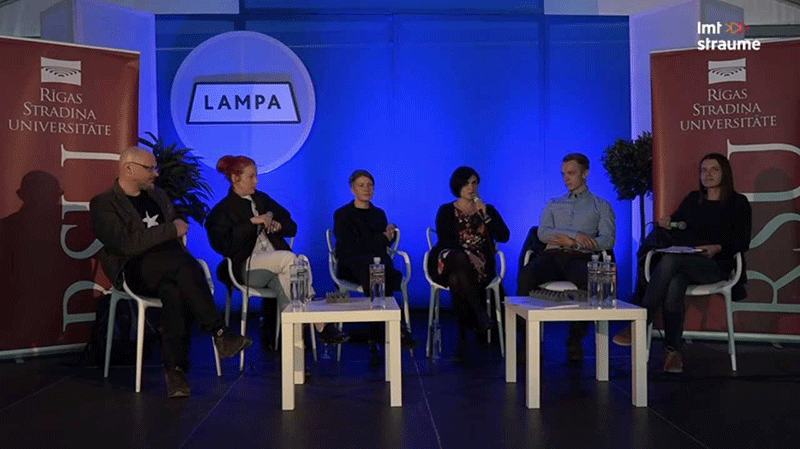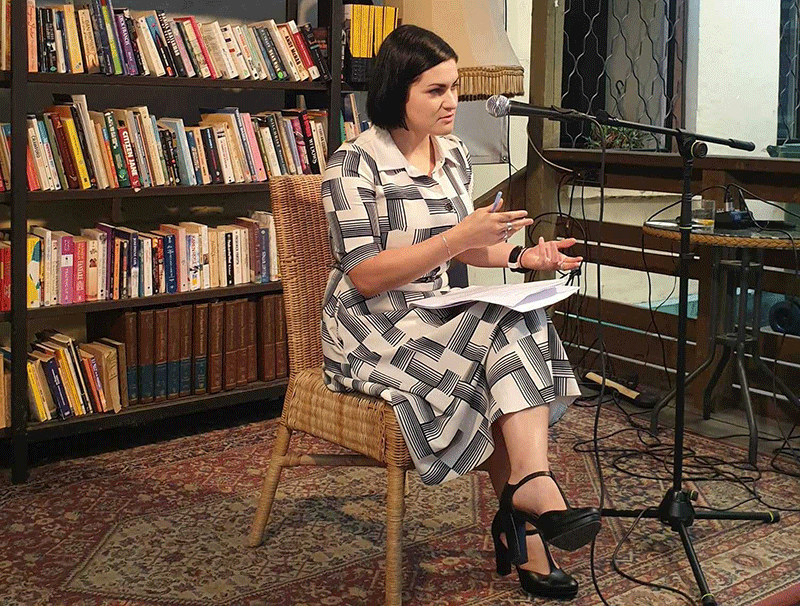Studying Social Anthropology Dispels Myths and Seemingly Self-Evident Assumptions
Anna Žabicka, a graduate of the Rīga Stradiņš University (RSU) Social Anthropology programme, is currently pursuing doctoral studies in Austria. From time to time her path brings her back to RSU, "and I am truly glad about it," admits Anna who has been an administrative staff member at RSU as well as a teacher. Over the past year she has been reviewing RSU social anthropology students' master's and she is also one of the researchers participating in the State Performance and Biosocial Relatedness (RELATE.LV) project carried out by the RSU Department of Communication Studies.
As part of the project she studies and analyses the interplay between the state and kinship in speeches by the members of the Saeima during parliamentary sittings. In other words, she analyses the way MPs link, formulate, form, and influence the dynamic relations between the state and kinship at different times.

What is social anthropology exactly?
In the broadest sense, anthropology is the scientific study of humans. Social anthropologists focus on human relationships: both the ones they form and those that shape their identities. In addition, the relationship is not limited to interpersonal relations, but also covers people’s relationship to their ancestors, historical events, places, time, nature, landscape, animals, global corporations, public institutions, political regimes, design, art, health and social care, etc. There is an abundance of opportunities for research, which explains the large number of different sub-sectors of anthropology.
Was your choice to study social anthropology at RSU accidental or deliberate?
To be honest, it is quite hard to remember now because I have been working in this field for eight years. At the time I was working as a biology teacher: I have a bachelor's degree in Environmental Science. At one point the school itself and the children and adolescents I was working with started to seem more interesting to me than biology. I do not recall the reasoning behind choosing anthropology instead of social work, for example.
When I started looking for where to study, RSU's appeal lay in the fact that it had quite a lot of international lecturers. The study environment seemed open to those with no previous connection to anthropology, like in my case.
I threw myself into the field quite quickly, and it also did not take long for me to understand that it was medicine, health care and social work that I was most interested in.
What are your most vivid memories of studying here?
I have a lot of good memories! Professionally, these studies changed everything for me because I changed my area of activity, and since then I have been completely absorbed in anthropology – after graduating from RSU, I obtained another master's degree in Medical Anthropology at Wayne State University in Detroit (Michigan, USA). Currently I am pursuing doctoral studies at the University of Vienna with a focus on care. Consequently, RSU was my first step on this path and I continue our cooperation and have many excellent colleagues and friends from RSU.
I have very good memories of organising the Baltic Summer School of Anthropology every other year with my classmates. The most recent one was held a year ago. I enjoyed the sense of the community, which was and continues to be a fertile environment for exchanging a wide variety of thoughts on research, teaching and social sciences. During my studies here, I got to know my closest friends. If science on and about people brings actual people together, it is a double victory.

Graduation ceremony for RSU master’s students in anthropology. 2014 (Anna is fifth from the right)
What has studying social anthropology given you?
In practical terms, it has given me the field of activity around which my life revolves. But if we are talking about the research itself, as I see it
anthropology allows everyone, including those who do not feel like dedicating their life to science, to develop empathy and the necessary skills to see beyond the “obvious”. I would even say that anthropology, which forms part of the humanities and social sciences, has the potential of healing people and communities.
But that can only happen if we continue to reflect on the ghosts of our colonial past and if we are sufficiently critical towards our own academic arrangements within the field.
Students in the Social Anthropology master's programme have to study a lot of scientific literature, etc. How did you deal with the high volume of reading?
Of course, it was not easy as I also had a full-time job. But it is not worth it any other way. Besides, when I started studying in the US, I read and wrote at least three times as much. The writing process is always much more demanding, apart from the ability to focus and analyse it also requires creativity and novelty.
When it comes to volume, we must not forget that it is all very interesting and world-changing at the beginning. You have to weigh what you want or don't want from studying. If you want to leave the study process as neutrally and effortlessly as possible, then I would not recommend anthropology.
Is there any myth or stereotype you have dispelled by studying social anthropology?
The first years dispelled a lot of myths and seemingly self-evident assumptions. As I mentioned before, the main advantage of anthropology is that it allows you to see events from a completely different perspective that would otherwise remain invisible. But, of course, human beings are inclined to classify everything into neat little mental boxes, so breaking our assumptions, constantly reflecting on conclusions we have made, and allowing ourselves to be surprised or even consciously looking for the unexpected is a mandatory part of the daily research process in anthropology.

Discussion “Death is not the end. The social life of the body post-mortem" at the conversation festival Lampa in 2018 together with RSU Assistant Professor Ivars Neiders, RSU lecturer and researcher Inese Čakstiņa, Assistant Professor Ieva Lībiete and surgeon Aleksandrs Maļcevs.
What is your scientific research work currently focused on?
My thesis study, which is still in very early stages and is likely to be somewhat delayed because of the current public health risks, is dedicated to the topic of ageing and elder care in Latvia. The study is about institutional care for the elderly as a practice and a resource that shapes and transforms (and possibly strengthens, or disrupts) relationships, and that becomes part of a more general social reproduction in the rural areas of Latvia. Through care practices, I address issues of ageing as a personally and socially important transitional period, peoples' feelings about their sense of belonging to the state, society, and time (or lack thereof), as well as the future they imagine in the Latvian countryside and the views they have on rural Latvia.

Open lecture organised by the Latvian Association of Anthropologists at Robert's Books cafe in 2019.
This year is the 70th anniversary of RSU. What would you wish to RSU?
I wish for RSU to always prioritise the quality of education and science, maximise the support provided to lecturers for teaching and research, and to be proud of its students! And also to see the value of the humanities and social sciences in medicine and healthcare.
A few facts about Anna Žabicka
- M. A., Mg. sc. soc.
- Since 2019: Doctoral studies in social anthropology at the University of Vienna (Universität Wien), Austria
- 2017 – 2019: Master’s studies in medical anthropology at Wayne State University, USA
- 2012 – 2014: RSU Social Anthropology master’s study programme
- Since August 2019: Adviser to the Minister of Health
- 2017: Fulbright scholar
Related news
 RSU receives record number of admission applicationsFor Students, Consolidation, For RSU Employees, Internal consolidation, RSU LSPA, For High School Students, Admissions
RSU receives record number of admission applicationsFor Students, Consolidation, For RSU Employees, Internal consolidation, RSU LSPA, For High School Students, Admissions


